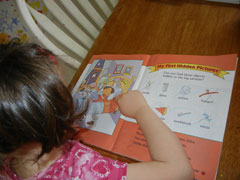How SPD Affects Visual and Auditory Processing

In What Ways Might SPD Affect Visual and Auditory Processing?
Children who have Sensory Processing Disorder will almost always have, to various degrees, some level of auditory and/or visual processing deficits.
No child is born with perfect auditory processing. This is a learned, developed and acquired skill. They also are not born with perfect visual processing. It must develop over time, it must integrate, in both areas. When they are very young, it is not abnormal to see these problems. It becomes an issue usually, as they become reading age, and you see difficulties arise from inefficient processing in either or both of these areas.
An Audiologist typically cannot perform a reliable Auditory Processing Evaluation until the child is seven years old, and developmentally at least halfway through the first grade. Although a developmental opthamologist may be able to identify visual processing disorder with a much younger child.
There is much intervention that can be done in the interim, to aid them to develop more efficient processing prior to school age. During the course of your SPD child's normal sensory diet activities, and during the routine of your day, a parent can help with either of these issues. By the time a child can be reliably tested, a therapist and parent can already have helped a lot.
Auditory Processing
When you speak to a child that seems not to hear you, even though their hearing has been checked and was within normal limits, gently touch a shoulder, or crouch down in front of them, and speak directly to them. They may have to turn their head to listen to you. This does not necessarily mean there is an issue with eye contact. It can simply mean that it can be too much stimulation to watch your face, and listen at the same time. It becomes a cognitive response, not an automatic, associative one.
Think of this in adult terms, and you'll understand: You are driving your car, the radio is on, the kids are talking, and you are doing fine. Driving is automatic. (It's an associative, task.) You adjust the mirror, turn the radio station, tell the little darlings to settle down. No problem. You can drive in the middle of your normal chaos without really thinking much about it, right? Then a thunderstorm hits. Driving gets tricky, you suddenly can't see, even though your windshield wipers are going full speed. What do you do?
"KIDS! BE QUIET!! I'm trying to drive, here!"
You lean forward, hands gripping the wheel, with your full and focused attention suddenly on your driving. Now, it has become a deliberate focused (cognitive) task.
This is what it's like for our kids to listen. Many of them have to give listening their complete, undivided attention to be able to accomplish it. They may look away, trying to process exclusively what they are hearing. Not only do they frequently hear garbled sounds, and miss certain words, and sounds, but sometimes processing is delayed, so they may not actually register what you said for moments or minutes.
Can we understand, and give them a minute to respond? If we understand, we can.
We can also understand that when we give them multiple directions, that may be asking for more than they can give. They just can't. So, we give them one direction, then wait to make sure they understand what we said, and what we mean. When you see a pattern of correct responses to one direction, then go to two.
We can teach them to remind themselves as they walk away, what they are trying to remember. Repeatedly whisper the directions to themselves. "Ok, first I am going to wash my hands, and next brush my teeth. Wash my hands, brush my teeth. Wash my hands, brush my teeth" Whisper along with them, until they get it, that's it's okay to remind ourselves. Use the words, FIRST, NEXT, and LAST to help them remember the order of things. There are many ways we can help them to develop more efficient processing long before testing can be completed.
Visual Processing
Their eyes get tired, they may get very frustrated if they are forced to read, or look for lengthy periods of time at anything. Visual tracking (eyes moving smoothly from left to right) can seriously interfere with reading. Things to work into a daily sensory diet, and do feel comfortable asking your OT for particulars about your own child. Tossing a ball. Catching a nerf ball while swinging. Horizontal swinging in a net swing. Any vestibular input motions. Hitting a ball on a T-Ball stand. Any activities that make the eyes track, especially while something is in motion.
There is more to visual processing than we can even imagine. Sensitivity to noises, oculomotor control, sensitivity to light. Your child's therapist should help you discover which activities your child needs to address their particular issues. It is very important to learn, and practice at home these activities with your child, as frequently as you can.
Consider this:
If you go to the gym once or twice a week, do you see rapid changes, and weight loss that amazes you? Probably not. But if you worked out every single day.... what changes might you see then? Exercising your muscles to make them stronger is very much the same as exercising the entire nervous system to bring about a stronger, more efficiently processing sensory system. Our children exercise their senses.